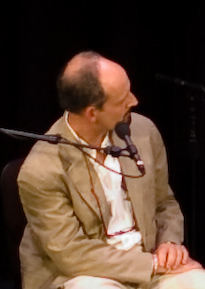A Quote by Marc Bekoff
When animals express their feelings they pour out like water from a spout. Animals' emotions are raw, unfiltered, and uncontrolled. Their joy is the purest and most contagious of joys and their grief the deepest and most devastating. Their passions bring us to our knees in delight and sorrow.
Related Quotes
Christ walked the path every mortal is called to walk so that he would know how to succor and strengthen us in our most difficult times. He knows the deepest and most personal burdens we carry. He knows the most public and poignant pains we bear. He descended below al such grief in order that he might lift us above it. There is no anguish or sorrow or sadness in life that he has not suffered in our behalf and borne away upon his own valiant and compassionate shoulders.
We are all animals of this planet. We are all creatures. And nonhuman animals experience pain sensations just like we do. They too are strong, intelligent, industrious, mobile, and evolutional. They too are capable of growth and adaptation. Like us, firsthand foremost, they are earthlings. And like us, they are surviving. Like us they also seek their own comfort rather than discomfort. And like us they express degrees of emotion. In short like us, they are alive.
Our family holidays always include our animals. On Thanksgiving, we love to walk around our farm and visit with our rescued pigs, goats, horses, emus and many other rescued animals. We give them all special vegetables that day, and the whole family enjoys a vegetarian Thanksgiving dinner. We know that the animals are giving thanks that day, and we are also giving thanks for the joy they bring to our lives.
The difference between shallow happiness and a deep, sustaining joy is sorrow. Happiness lives where sorrow is not. When sorrow arrives, happiness dies. It can't stand pain. Joy, on the other hand, rises from sorrow and therefore can withstand all grief. Joy, by the grace of God, is the transfiguration of suffering into endurance, and of endurance into character, and of character into hope--and the hope that has become our joy does not (as happiness must for those who depend up on it) disappoint us.
Some meat eaters defend meat eating by pointing out that it is natural: in the wild, animals eat one another. The animals that end up on our breakfast, lunch, and dinner plates, however, aren't those who normally eat other animals. The animals we exploit for food are not the lions and tigers and bears of the world. For the most part, we eat the gentle vegan animals. However, on today's farms, we actually force them to become meat eaters by making them eat feed containing the rendered remains of other animals, which they would never eat in the wild.
The greatest joys and the greatest sorrows we experience are in family relationships. The joys come from putting the welfare of others above our own. That is what love is. And the sorrow comes primarily from selfishness, which is the absence of love. The ideal God holds for us is to form families in the way most likely to lead to happiness and away from sorrow.
Scientists have been saying, for an awfully long time, that we're all interconnected. Scientists would use the word 'ecosystem' to express that idea. Obviously, people can't survive without air and water, and we rely on plants and animals for food, and plants and animals rely on us to preserve their habitats.
Humans — who enslave, castrate, experiment on, and fillet other animals — have had an understandable penchant for pretending animals do not feel pain. A sharp distinction between humans and 'animals' is essential if we are to bend them to our will, make them work for us, wear them, eat them — without any disquieting tinges of guilt or regret. It is unseemly of us, who often behave so unfeelingly toward other animals, to contend that only humans can suffer. The behavior of other animals renders such pretensions specious. They are just too much like us.


































